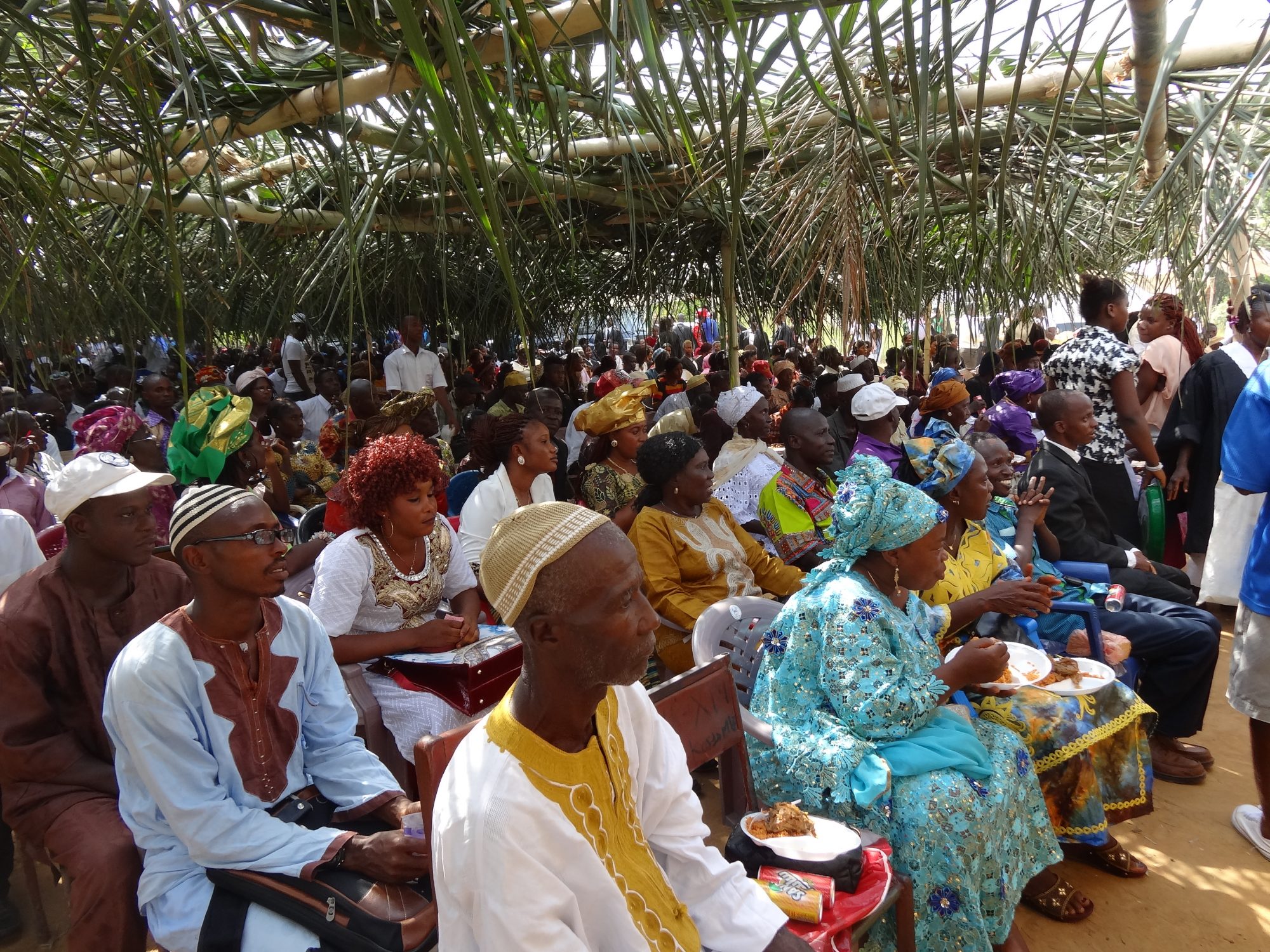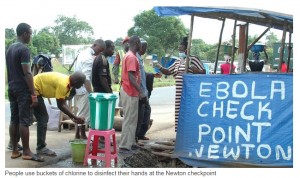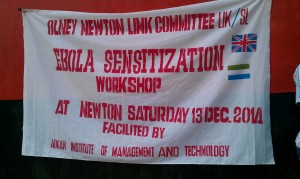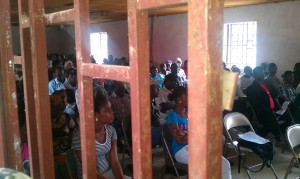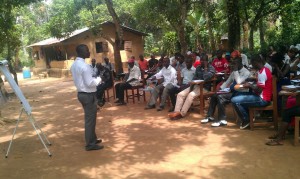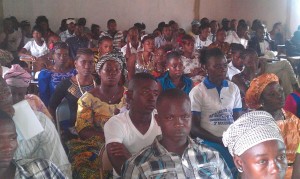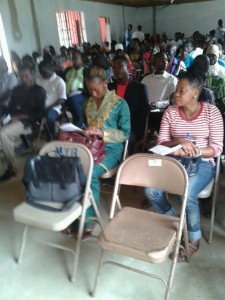Freetown, Jan. 12, 015 (MOHS) – The National Malaria Control Programme, Ministry of Health and Sanitation will be conducting its second cycle of the Mass Drug Administration Campaign from January 16 – 19, 2015 in selected chiefdoms in the Bombali , Kambia, Koinadugu, Moyamba, Port Loko, Tonkolili and in all Wards in the Western Urban, Rural Area.
Addressing a press conference at the National Malaria Control Programme at New England Ville in Freetown, the Programme Manager, Dr. Samuel Smith noted the Ebola emergency situation, and the effect of the outbreak that has created numerous challenges for the continuation of routine health delivery services at all levels. The Ebola outbreak he added is having some adverse effects on the malaria programme intervention if appropriate measures are not put in place to support the malaria activities.
The goal of the campaign is to contribute to the containment of the Ebola outbreak in the country thereby reducing morbidity and mortality, with specific objectives to rapidly reduce malaria related incidence and mortality rates by providing intervalled Mass Distribution Administration using Artesunate/Amodaquine (AS/AQ) targeting all ages including children under five and pregnant women. The campaign also aimed at the rapid reduction of number of febrile Ebola suspected cases that would otherwise have required screening and isolation in the Ebola suspected holding centres to exclude Ebola as the cause of illness; and reduce the risk of Ebola transmission among malaria patients.
Dilating on the criteria for exclusion, Dr. Smith said a total population of 2,386, 968 are targeted to cover all ages above 6 months. Children below 6 months, malnourish children, pregnant women who are in their first three months, and all persons with fever and or looking sick are exempted. “Anyone who has received the AS/AQ drug within the last month, patients taking Zidovudine, Efavirenz or co-trimoxazole, are also exclusion to the drug administration”, said Dr. Smith.
|
| Programme Manager, Dr. Samuel Juana Smith briefing the Journalists |
Quarantine houses, the Programme Manager re-emphasized must not be visited for the distribution by the MDA teams, adding that alternative arrangements have been made through Surveillance Officers and Contact Tracers at district level.
Answering questions on the findings for the 1st cycle Mass Drug Administration and the utilization of health facilities, Dr. Smith opined that there has been a significant decline in the utilization of health facilities across the country, with malaria prevention and diarrhea continue to be the primary killers of children under five in Sierra Leone, and will remain the main killers during the outbreak, that the detection and management of Ebola and malaria has been challenging for health workers as the initial clinical presentation of the two diseases is similar. All the targeted 24 chiefdoms in six districts and 30 zones in the Western Ares (10 zones in rural and 20 in urban were covered with satisfactory implementation coverage.
Other highlights in his presentation include lessons learnt in relation to strength, weakness, challenges, mistrust and misconception.
In his contribution, the Registrar of Pharmacy Board, Wiltshire Johnson dilated on Drug Safety and Monitoring.
He spoke on the side effects of the drug as in any other drugs, pointing out that it has been proven safe in line with WHO standard and protocols. Mr. Johnson noted the misconception, rumours and mistrust, disclosing that no established evidence of death was registered during the 1st cycle MDA campaign as a result of the drug, and encouraged compliance in line with the prescribed dosage and criteria of exclusion.
The Public Relations Officer and Chairman for the occasion, Jonathan AbassKamara said social mobilization and community engagement, use of the media and other approaches heightened awareness about the MDA distribution campaign.
He expressed gratitude and appreciation to both the electronic and print media for the pivotal role played in the sensitization and education on the 1st cycle MDA campaign, encouraged journalists to give the same prominence to the forth coming campaign in January 16, 2015.
Mr. Kamara reiterated that the drugs will be administered FREE OF COST.
KK/MOHS
MASS DRUG ADMINISTRATION FOR MALARIA – 16TH -19TH JANUARY 2015
QUESTIONS AND ANSWERS ON MASS DRUG ADMINISTRATION (MDA)
National Malaria Control Programme and Partners, UNICEF, WHO, Global Fund, MSF, Roll Back Malaria
WHAT IS THE CAMPAIGN ABOUT?
Mass Drug Administration (MDA) is the treatment of a well defined population in a geographic area with a curative dose of an Antimalarial drug without first testing for infection and regardless of the presence of symptoms.
MDA is being considered and tested as a strategy to reduce the burden of malaria with the goal of elimination. It may result in a short-term reduction in malaria parasitaemia among the population.
WHY ARE WE DOING THE CAMPAIGN?
– To rapidly and significantly reduce clinical malaria and the resultant mortality among highest risk target population children and pregnant women;
– To rapidly reduce the number of febrile episodes(suspected Ebola cases) that would otherwise have required screening and isolation to exclude Ebola as the cause of illnesses;
– To improve diagnostic accuracy in diagnosis of suspected EVD cases by reducing the disease most likely to be mistaken for EVD, while reducing the burden on overloaded Ebola Treatment Units and Health Facilities;
WHO ARE THE BENEFICIARIES OF THIS CAMPAIGN?
Target will be populations older than 6 months old including adults
WHO ARE EXEMPTED FROM THIS CAMPAIGN?
- Children below 6 months
- Malnourished children
- Pregnant women who are in their first three months
- All persons who are ill (looking sick) according to the Ebola Alert Criteria – (cared for someone with Ebola, attended a funeral of someone with Ebola)
- Anyone who has received AS+AQ within the last month.
- Patient taking Zidovudine, Efavirenz or co-trimoxazole and
- Quarantine houses (alternative arrangements are made for them through surveillance officers and contact tracers)
WHEN IS THE CAMPAIGN?
The 2nd Cycle of the campaign will be from the 16th to 19th January 2015
WHERE IS THE CAMPAIGN?
The campaign will be conducted in selected chiefdoms in Bombali, Kambia, Koinadugu, Moyamba, Port Loko, Tonkolili and all wards in Western Area (Urban and Rural)
HOW ARE WE GOING TO DO THE CAMPAIGN?
– The MDA distribution will be held during the high malaria transmission period (November 2014 to January 2015) in two cycles with an interval of 30 to 45 days to ensure therapeutic blood levels of AS/AQ over the targeted period;
– Administration of this regimen would be door-to-door, with Directly Observed Treatment (DOT) for first dose. The client will be educated and encouraged to comply with the treatment regimen by taking the two subsequent doses on the two days following the administration of the first dose.
– Distribution will be accompanied with strict adherence to the “no touch” policy.
WHY AS+AQ FOR THE CAMPAIGN?:
– AS/AQ has been chosen for the MDA because it is the first line drug for the treatment of uncomplicated malaria in Sierra Leone. It is efficacious, safe, and well tolerated.
– There is no reported local resistance to AS/AQ;
– The drug AS/AQ is well known and acceptable to the Sierra Leonean population;
– Health Workers and Community Health Workers are already trained to administer AS/AQ;
– Fixed Does AS/AQ is known to be highly effective and acceptable in the targeted areas and is available.
– Drug will be delivered in age appropriate blister-packs of 3 fixed does.
POTENTIAL BENEFITS OF MDA
– Reduction in malaria morbidity/mortality;
– Decreased presentation of febrile patients in the targeted communities and holding centres, resulting in potential decrease risk of transmission of Ebola to malaria patients;
– Reduction of “Non Ebola” pressure on the health system;
– Improved community engagement with disaffected population;
– Improved linkage with other services (integration)
ROLES AND RESPONSIBILITIES OF PARENTS/GUARDIANS
Parents/Guardians and Individuals should Ensure:
- All members of the household 6 months and above receive AS+AQ tablets
- To adhere to the prescribed AS+AQ dose according to the age.
- To complete the three days treatment regimen.
- To report immediately any side effects observed during the course of taking the AS+AQ tablets.
- Native herbs must not be taken with the Antimalarial tablets during the three days regime.
- Never to share the prescribed dose for an individual with someone else.
